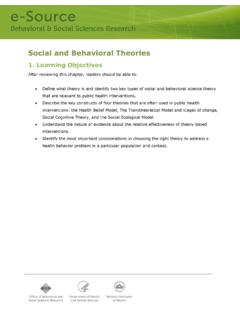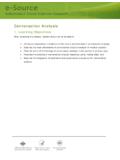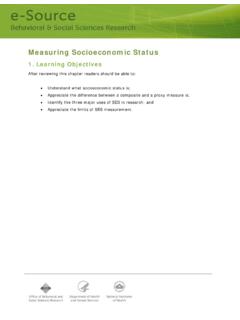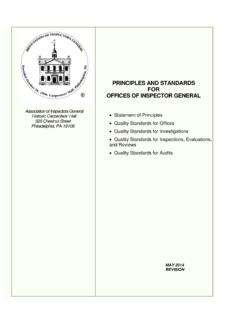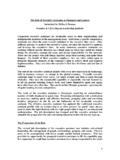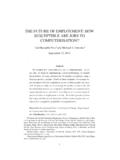Transcription of Ethical Challenges of Research - esourceresearch.org
1 Ethical Challenges of Research 1. Learning Objectives After reviewing this chapter readers should be able to: Understand why ethics is important to Research ; Identify codes of ethics that address Research ; Describe the Belmont Principles; Identify some issues surrounding the Belmont Principles today; Understand the roles of Research ethics committees; Identify some issues surrounding Research ethics committees; and Identify other elements critical to responsible conduct of Research . Aside from direct treatment of human and non-human subjects, how Research is conducted is an important aspect of whether or not it is Ethical . For example, strict adherence to the Research design, protocol and analytic plan is critical to data integrity. Avoidance or disclosure of financial and/or personal conflicts of interest may affect subject recruitment as well real or perceived objectivity or bias in recruitment and in analysis and reporting results.
2 These aspects of Research behavior, along with adherence to accepted scientific practice, such as honesty in authorship, data collection, analyses and reporting, avoiding conflicts of interest of reviewers, avoiding misconduct and misbehavior and reporting it if present, all contribute to whether Research is Ethical . 2. Introduction What does ethics have to do with Research ? Ethical codes or principles are an expression of how we should behave as individuals and as a society. They are moral judgments that can be applied to particular situations to help us make decisions and guide our behavior. Inevitably, they are linked to cultural values at a particular time in our history and are subject to change as attitudes and values evolve. What was normative just a half century ago, may be considered insensitive today. In Research there may be a conflict between the expeditious conduct of a study and the burdens of doing what is respectful to animals or humans.
3 On the one hand, researchers are focused on expanding knowledge and on the methodology of their projects such as subject selection, sample size, Research protocols, statistical analysis, equipment, and personnel. At the same time, as inherently responsible persons, they try to respect the Research environment, which requires attention to the appropriate use not only of physical resources including funds, but also to human and animal subjects. Only when the Research is of sufficient quality to potentially contribute to knowledge can we justify involving humans or animals and utilizing other resources. Ethical considerations may help us decide whether the Research should even be done, and if so, how it should be pursued. How we conduct our scientific endeavors not only affects those directly involved, but also the public s perception of science and scientists.
4 Results from Research provide a basis for further studies, and in addition may influence public policy and legislation. Challenges to scientific integrity can erode public confidence and belief in findings. Therefore, it is important to be transparent, competent, honest, and follow Ethical guidelines in regard to Research subjects. 2. Introduction Welfare of Human Subjects The first modern code governing ethics of Research was developed during the Nuremburg trials of Nazi war crimes in response to abuses during medical experimentation on humans. Subsequently, there was concern with protection of human subjects of Research in the US in the 1950s and 1960s. Media reports about abuses during Research stimulated legislation that led to the development of Ethical principles and regulations. Standards for use of animals in Research have also been developed. Environmental Safety and Protection Environmental exposure that imposed risk of harm stimulated workplace welfare provisions in such areas as radiation safety, chemicals, biologic pathogens, ergonomics.
5 OSHA Hazard Communication Standard (29 CFR ) and Occupational Exposure to Hazardous Chemicals in Laboratories (29 CFR ). OSHA Bloodborne Pathogen standard (29 CFR ). Many institutions provide on-line training in laboratory and workplace safety. Ethical principles, codes of ethics and oversight of Research provide guidance. However, continuing attention to Research conduct is needed in view of the fact that a meta-analysis of survey studies found that 30-74% of respondents report that they have been involved in or observed inappropriate behavior in the conduct of Research (Fanelli, 2009). 3. Principles, Codes, and Standards Today The Nuremburg Code The Nuremburg Code, developed as a result of Nazi war crimes, was the first modern publication of Ethical guidelines for experimentation with humans. It states an explicit requirement for voluntary consent of Research subjects and spells out the elements of that consent.
6 The code stipulates that the use of human participants is permissible (justified) so long as: human subjects are necessary the results hold promise of benefit to society scientific basis and design are sound harms to humans are minimized or avoided risks are minimized, experimenters are qualified voluntary withdrawal of subjects is allowed and that the Research will be terminated if Research subjects are likely to be injured or harmed. The Nuremburg Code The Declaration of Helsinki The Belmont Report and The US Code of Federal Regulations: The Common Rule The Council of International Organizations of Medical Science (CIOMS) International Conference for Harmonization Guidelines for Good Clinical Practice (GCP) Standards and Operational Guidance for Health Related Research 3. Principles, Codes, and Standards Today The Declaration of Helsinki The Declaration of Helsinki, Ethical Principles for Medical Research Involving Human Subjects, was developed by the World Medical Association in 1964 and has been revised repeatedly, most recently in 2008.
7 It declares the necessity of Research with humans, physicians duty to safeguard health and privacy, puts human well-being before scientific advances, and requires consent free of coercion. It includes principles for Research including: sound science protection of human dignity ethics committee review and oversight risk benefit assessment and potential benefits outweigh risks of harm and risk can be managed the Research is important and likely to benefit the subject population participation is voluntary and subjects are fully informed The Declaration of Helsinki addresses situations in which consent is not possible, the need to share Research outcomes by publishing them, and the handling of situations in which Research is combined with medical care. The Belmont Report and The US Code of Federal Regulations: The Common Rule The Belmont Report, published in 1974, is a statement of Ethical principles governing Research with humans developed by the US Congressionally appointed Commission for the Protection of Human Subjects of Biomedical and Behavioral Research .
8 It identifies three Ethical principles: respect for persons, beneficence, and distributive justice. The Belmont principles have been codified into Regulations and the Common Rule and have been adopted in whole or part by nineteen US federal agencies to regulate Research with humans conducted or supported by the US government. Revisions to the Common Rule were proposed in July 2011. The proposed changes, responses to public comments, and the final revision will be available on the website of the Office Human Research Protections. 3. Principles, Codes, and Standards Today The Council for International Organization of Medical Sciences The Council for International Organizations of Medical Sciences (CIOMS) was founded by the World Health Organization (WHO) and the United Nations Educational, Scientific and Cultural Organization (UNESCO) in 1949. In the 1970s CIOMS and WHO worked on guidelines to indicate how the Ethical principles articulated in the Declaration of Helsinki could be applied to Research with humans, especially in developing countries.
9 As new Research methods and practices emerged, particularly the expansion of clinical trials in developing countries, conferences were held to address issues that were not covered in the original guidelines. In 2002, CIOMS published Ethical principles (they adopted the principles in The Belmont Report) and 21 guidelines that are broadly applicable, including in low resource countries. They cover Ethical justification of the Research , scientific validity, ethics committee review, informed consent and situations when consent is not attainable, inducements to participate in Research , risks and benefits, Research with low resource populations, choice of control groups in clinical trials, Research with vulnerable groups, confidentiality, compensation for injury in Research , strengthening infrastructure in developing countries, and Ethical obligation to provide health services. Each Guideline is accompanied by commentary.
10 In 2009, an update issued Guidelines for epidemiological Research was published. For updates see 3. The Conceptual Phase International Conference for Harmonization Guidelines for Good Clinical Practice (GCP) Good Clinical Practice Guidelines were developed by the International Conference on Harmonization (ICH). Governments can use them to develop regulations governing clinical trials with humans. They include protection of human rights, standards for conduct of trials, and responsibilities and roles of sponsors, investigators, monitors and clinical Research associates. When adhered to, the results of trials conducted multi-nationally should be acceptable for safety and efficacy decisions by all participating governments. In 2005, a Handbook for Good Clinical Practice was published and in 2009 an on-line course became available. Standards and Operational Guidance for Health Related Research The Standards and Operational Guidance for Health Related Research is a draft document released for comment in 2011 by the WHO.
